|
Today is International Day of the World's Indigenous
Peoples:
Experiencing the Adhivasi life
by Mahil Wijesinghe
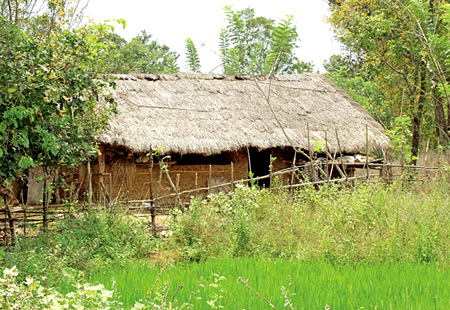 |
|
Typical Adhivasi house |
It was a sunny day and the harsh rays of the sun bounced off the
green foliage of the verdant forest canopy, sparking off a dance in the
darkness of the jungle. I am at Dambana, the ancestral habitat of the
Veddas or Adhivasi as they are called, about 20 kilometres from
Mahiyangana, to experience a way of life that is fast getting relegated
to history books - the lifestyle of the Adhivasi community.
As I get down from my vehicle, a self-appointed young Adhivasi guide
attaches himself to my side, guiding me along the footpaths and forest
cover, giving me an experience of Dambana before taking me to the house
of the present Vedda clan chief, UruwarigeWannila Aththo, son of
Uruwarige Tissahamy. Chiefdom in the Vedda society, like in any dynasty,
is passed on from father to son.
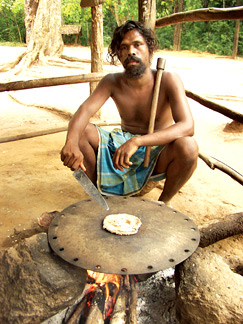 |
|
An Adhivasi making Roti |
Legends hold that the Veddas are descendants of the fabled founder of
the Sinhala race, Prince Vijaya, who came from North India 25 centuries
ago and married a native princess called Kuveni. Anthropologists
however, trace the Vedda lineage to early farmers who ranged from as far
as Australia 25,000 years ago.
Dwindling
In the course of the past half-century, a significant portion of the
dwindling Vedda population still living in the remotest reaches have
abandoned their traditional jungle habits of hunting and gathering, and
taken up lives as farmers opting for an alternative life style: Many now
live side by side with the Sinhala peasantry in the Central and Uva
Provinces around Mahiyangana and Bibile. Similarly, a few hundred of
them in the Eastern Province, near Gal Oya, have assimilated with the
Tamil population of the area and adopted Tamil ways and customs.
Today, the Veddas are a fast-vanishing tribe, though the chief,
Wannila Aththo, has to date staunchly withstood pressure to coax his
people out of the jungle habitats that have been the sanctuary of their
forefathers for millennia.
The land of Bintanna to the south east of Kandy was once a mighty
forest abundant with wildlife. The Veddas made this land their home and
the jungle near Dambana provided the traditional hunting ground.
The Mahaweli development program in 1980 greatly affected not only
the environment of the Adhivasi, but also their traditional way of life.
With this doorway to civilisation opening in their midst, the Veddas
have accepted that their primitive lifestyle cannot survive for much
longer.
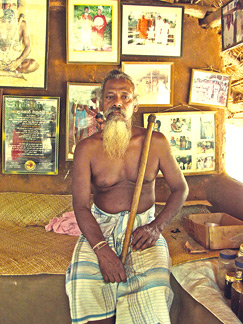 |
|
UruwarigeWannilaAththo, Chief of the Adhivasi clan in Dambana |
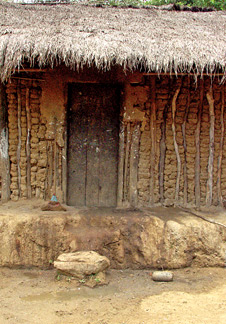 |
| A closed front
door of an Adhivasi house |
Today, around 200 Vedda families live in their ancestral homeland of
Dambana and in villages such as Kotabakina, Kandeganwila and Keragoda. A
majority of the villagers who accepted relocation to Hennanigama, 60
kilometres from Dambana, were given all facilities, including land,
proper access way, wells and money to build their homes. Most are happy
with their new life as farmers, but some miss the thrill of the hunt.
Dambana has become a destination for visitors and the Vedda village
is changing-gradually, becoming more a model village of a once upon a
time lifestyle, with the inhabitants relying more and more on making and
selling various souvenirs, as a livelihood, rather than hunting, which
was the livelihood of the Vedda forefathers.
Traditions
However, not all traditions have been wiped out. The Adhivasi clan
still worships tree gods and practice many traditional exorcist rituals
such as Kiri Koraha, to invoke the blessing of their dead, who lie
buried in the Dambana jungle. They invoke the spirits of the Nae Yakku
to protect them from calamity, disease and distress.
As I approach, a group of young Adhiwasis are waiting to perform the
Kiri Koraha ritual to invoke blessing on visitors to Dambana. Though the
adult visitors are eager to observe the ritual and receive the blessings
of the Kiri Koraha, it is a traumatic experience for the children, many
of who tightly cling on to their parents.
In the village, clan chief, Uruwarige Wannila Aththo, relaxes on a
mat, with his famed axe resting on a stand made of clay. His hut,
usually the centre of attention, has thatched roofing and mud walls. The
latter is covered in framed, colour and black and white photographs of
his meetings with Buddhist monks and various dignitaries, both local and
foreign. In the corner of the hut are several bottles of herbal oil and
bee honey. These are for sale.
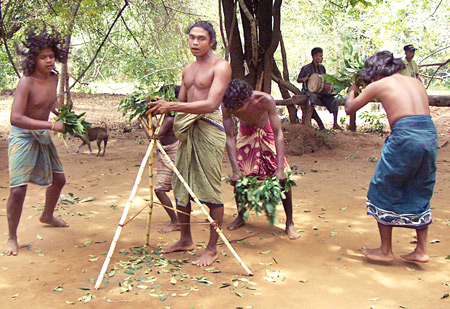 |
|
Young Adhivasi performing
the ancient ritual of ‘KiriKoraha’ |
As much as trade is becoming a new way of life, a koda moment with
the Vedda chief has also become part of the Dambana experience, with
every visitor clicking a selfie or posing for a photograph with the
Wannila Aththo.
The chief's son and heir, Uruwarige Gunabanda, a young man with a
scanty beard and mustache, sits in a sits in a shaded area of the forest
near his father's hut, axe on shoulder in traditional Vedda style. Like
his father and grandfather, he too will one day don the mantle of the
clan chief, but just how true to tradition the clan will remain is left
to be seen.
Rare
One of the most striking features of the Dambana village is its
museum, which showcases weapons and utensils used by the Veddas when
times were different. These together with the rare photographs of early
generations of the Adhivasi people prod home the reality of changing
times, changing lifestyles.
The museum, propped up with clay walls also contains a few cave
drawing done by the Adhivasi peoples during the stone-age. Both the
lifestyle depicted in the drawing and the items on display are alien to
the younger generation of Adhivasis, who are rapidly acclimatizing
themselves to change. Some of them have become paddy cultivates and some
have taken up other professions. They look to the future with great
expectations. |

